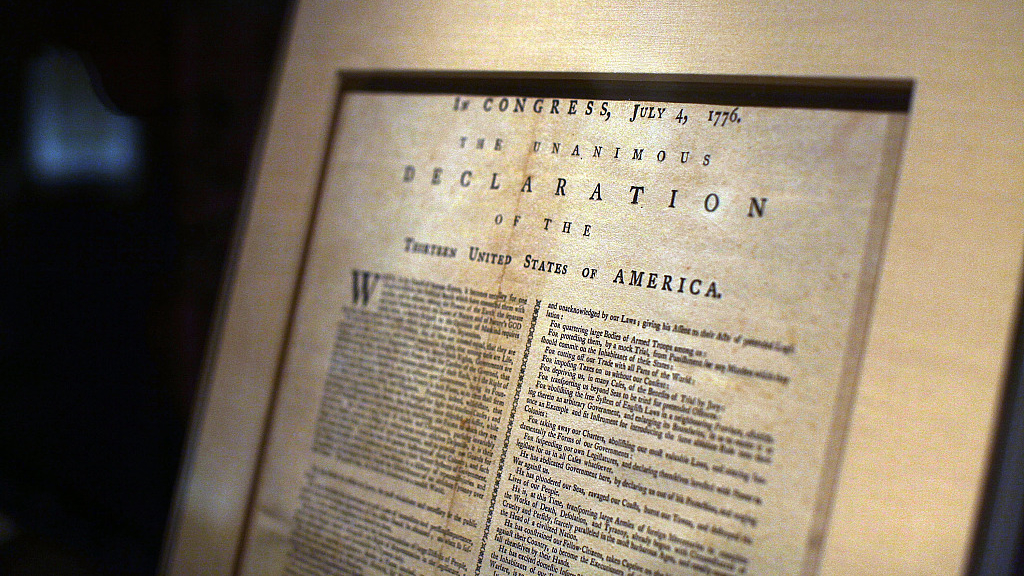

Editor's note: Tom Fowdy is a British political and international relations analyst and a graduate of Durham and Oxford universities. He writes on topics pertaining to China, the DPRK, Britain and the U.S. The article reflects the author's opinion, and not necessarily the views of CGTN.
In America, July 4 is a day marked with triumphant celebrations, joyful patriotism and ecstatic feelings. It is of course the country's Independence Day. In the year 1776, after a successful war against the British Crown, the country's 13 colonies situated on the East Coast of the American continent ratified what was known as the Declaration of Independence – authored by Thomas Jefferson.
The statement would pave the way for what eventually evolve into the United States of America, marking the start of a new era of history. With British rule having come to an end, Americans today look back on the event as the triumph of freedom and liberty in their country. The states were free and independent, no longer subservient to a foreign dominion.
Whilst Americans advocate these values strongly and dear, it is nevertheless important to analyse the American Revolution and the Declaration of Independence in the light of the social and economic forces which drove it.
In the light of profound ideological changes taking place in the 18th century, the events leading to the establishment of the United States might be termed as a "bourgeois revolution"; in that an empowered middle or "landowner" class effectively overpowered the old guard of monarchism, in turn establishing a new revolutionary political order which would be geared to their sustaining economic interests at the expense of autocracy.
Such is critical context to understanding not only America's expansion westwards and global ascendancy.
The 18th century was a pivotal turning point in Western history. Only 100 years or so previously had the traditional hierarchical order of feudalism, whereby nobles were designated lands by monarchies in exchange for political support, came to an end.
In its place emerged a new entrepreneurial middle class, who were able to own lands within their own right, subsequently decoupling their economic interests from an obligation to autocracy.

The Statue of Liberty. /VCG Photo
This led to frictions between the two classes, which in turn produced ideological change in this era in what is termed "the enlightenment". As the emerging Middle Class became inevitably cynical of autocratic power and sought to push back against: political theorists such as John Locke explored the idea of "government by consent" and of course man's rights to private property, all of which would become highly influential in the birth of America.
The paramount issue which produced the American Revolution is famously of course, tax. British rulers sought to impose taxes upon their associated colonies whilst depriving them of political power and influence within the center. This was perceived as an infringement upon the rights of the landowners, and in turn with notable rebellion such as the "Boston Tea Party" – the disputes soon accumulated into the American Revolutionary War.
In the process of such a conflict, the bourgeois class which had grown to dominate the American colonies effectively defeated and displaced the authority of the British crown, establishing a new political order upon classical liberal ideas, all of which were most attuned of their direct economic interests, thus was born the United States, a country whereby capitalism and entrepreneurship could operate unmolested by superior powers, and thus conceptualizing the "American Dream".
Of course, although the liberal ideas instrumental in its foundation were proclaimed vocally, it was for all intents and purposes, a landowner's nation ran by and for, such a class grouping. Given this, the economic incentives of such a system would prove to be pivotal in driving its westward expansion and acquisition new territory, whilst also expanding and promulgating practices such as slavery.
Born from a process of class conflict, it was never born nor intended at the start to benefit absolutely everyone. The conceptualizations of equal rights and justices which would later come to define its politics often had to be fought for against the will of those who benefited it.
In this light, the American Revolution may be interpreted by some not as a definitive moment or conclusion in itself, but a never ending and ongoing struggle throughout history with the view of establishing the ideal and dream of a nation.
Given such, many Americans are proud of the events of 1776 as a start line, than a finishing point; a hope of not only political, but eventual social and economic liberation too. Living in a country established initially upon the interests of the landowning and entrepreneurial classes, there is subsequently so much to be done before the American dream can be extended to all.
(If you want to contribute and have specific expertise, please contact us at opinions@cgtn.com.)

Copyright © 2018 CGTN. Beijing ICP prepared NO.16065310-3
Copyright © 2018 CGTN. Beijing ICP prepared NO.16065310-3